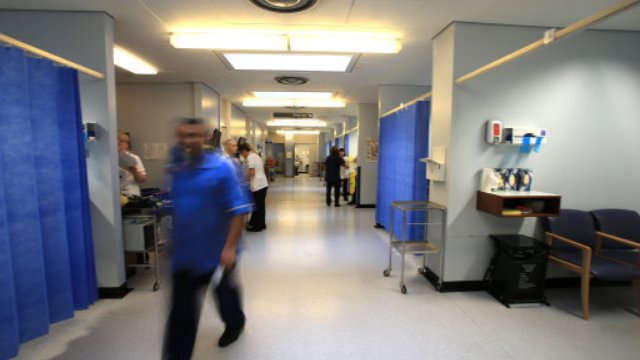On Air Now
Capital Breakfast with Fat Brestovci & Laura Anderson 6am - 10am
27 December 2016, 07:02 | Updated: 27 December 2016, 07:03

Doctors' leaders have warned that politicians risk losing sight of the "unprecedented'' challenges facing the NHS in Scotland.
Dr Peter Bennie, chairman of the British Medical Association (BMA) in Scotland, outlined the organisation's concerns over areas such as funding, vacancies and recruitment and called for a New Year commitment to developing and delivering a "clear plan'' for the future of the health service.
Calling for a public debate on funding the NHS, he warned: "If the gap between demand and resources is going to continue, then there is no choice but to ask what the NHS in Scotland can and can't deliver in the future.''
In his Christmas message, Dr Bennie said: "Our NHS is highly valued, accessible to all, free at the point of use, and takes care of the nation's health needs from cradle to grave.
"Yet the challenges facing it today are unprecedented, raising complex questions about how we can sustain our health service for future generations.''
He claimed the NHS is currently "struggling to cope'' and pointed to various reports which he said set out the growing challenges facing the NHS.
"But despite the body of evidence to show that urgent action is needed now, the much needed plans for action have been allowed to slip,'' Dr Bennie said.
"Holyrood's Health and Sport Committee has drawn attention to major problems with recruitment and retention across the health and social care sectors in Scotland - not just the NHS - and they highlight specific issues in remote and rural areas.
"The Government's response must not simply repeat the tired mantra that Scotland is spending more money on the NHS than ever before, and has more nurses and doctors than ever before. This completely misses the point.''
The BMA said there are "significant problems'' with the recruitment and retention of doctors, nurses and allied health professionals and called for action ``to make Scotland a more attractive place to work''.
Dr Bennie claimed that funding is not keeping pace with the demands on the health service and said it has been "virtually stagnant'' across the UK since the onset of austerity.
"If the NHS does not get the resources it needs to keep pace with demand, then the only alternative is to look at the range and models of services that can realistically be delivered within the budget provided,'' he warned.
"At the BMA, we have been calling for an honest, public debate about whether or not Scotland is willing to invest the resources that the NHS needs to deliver the current range and level of services.
"We will continue to emphasise the need for this debate with the public and politicians as discussions take place about the health and social care delivery plan which was recently published by the Scottish Government.
"If politicians and the public are not prepared to accept changes to the way healthcare is delivered in their area, how are any changes actually going to be achieved?
"Let's make a commitment for the New Year to set our sights firmly on finally developing and delivering a clear plan for an appropriately designed and resourced NHS in Scotland.''
Scottish Labour described the message as a "powerful intervention'' from the doctors.
Health spokesman Anas Sarwar said: "It is painfully clear that the SNP's failure to properly workforce plan has left our NHS staff over-worked, under-valued and under-resourced. This has left our NHS struggling to cope with demand.''
Scottish Liberal Democrat leader Willie Rennie said: "The huge demand for services and the changing nature of that demand means the NHS is facing an unprecedented challenge.''
Scottish Conservative shadow health secretary Donald Cameron MSP said: "For too long the SNP has failed to prioritise our health service, and as a result standards have dropped with almost all national targets missed last year.
"As the BMA rightly points out, we need to see urgent action taken by the SNP to tackle the staffing crisis we face.''
Health Secretary Shona Robison said: "We agree with the BMA on the need for a mature plan as a result of the changing nature of healthcare delivery because of the challenges of increasing demand and improving life expectancy.
"That's why the last few months has seen the publication of three crucial building blocks for the transformational change required. The National Clinical Strategy is a blueprint for what health and social care will look like in the decades to come.
"The Chief Medical Officer's annual report focusing on realistic medicine calls for a new relationship between doctors and patients and families built on mutual trust and shared decision making. The report describes reducing unwarranted variation in practice and outcomes which will in turn reduce harm and waste. This has already led to working differently and has been welcomed across all parts of the system.
"Finally, just this week, we published a National Delivery Plan with concrete actions for the next year and beyond. This plan has actions for boards, Government and other stakeholders and we look forward to the BMA being a full part of discussions about implementation.''